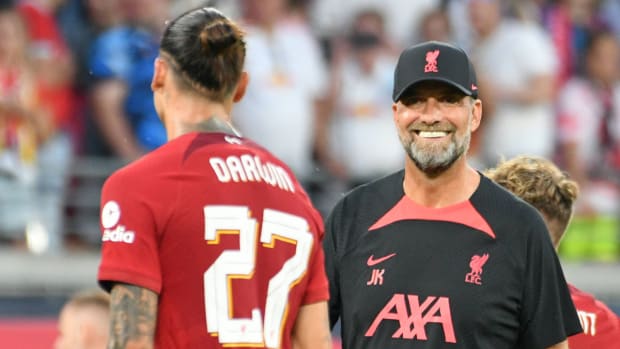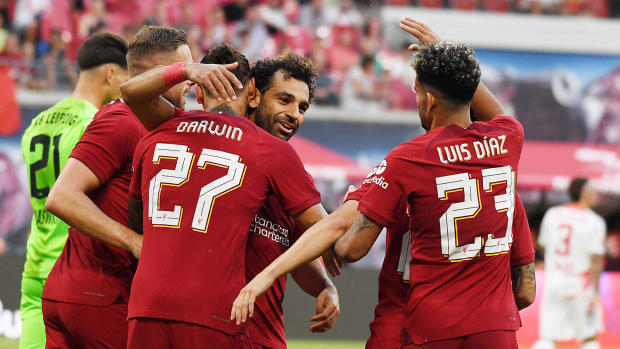Liverpool had known for a while that it needed to change. Its front three of Mohamed Salah, Roberto Firmino and Sadio Mané was one of the most potent attacking tridents in the history of the game, their complementary skills elevating each of the three individuals. But all three have turned 30 in the past year; quite apart from concerns that familiarity could breed staleness, it is dangerous to let a team grow old together.
Evolution is perhaps the hardest task facing a manager who would oversee a dynasty. It takes remarkable clear-sightedness to take apart something that has worked and begin to rebuild it. Liverpool as a club has managed those transitions extremely well, which is why it has been able to just about keep pace with Manchester City despite far less expenditure. But where resources really matter is that Liverpool can’t afford mistakes. City can buy a player who doesn’t work out and then simply replace him; if Liverpool squandered $50 million, it would have a knock-on effect that might potentially last seasons.
The pace of change at Anfield has perhaps been slightly quicker than Liverpool would have liked. Luis Díaz arrived in January, but the intention had been to wait at least six months. Liverpool had been tracking the Colombian for a while but was forced to act when Tottenham emerged as a potential buyer.

Bert Harzer/Eibner-Pressefoto/Imago Images
Similarly Darwin Núñez had been on Liverpool’s radar for a while, but his form last season coupled with Mané’s decision to leave for Bayern perhaps forced Liverpool’s hand. It will, of course, take time for everything to gel, and it was perhaps in recognition of that fact that Jürgen Klopp preferred to field Firmino from the start in the Community Shield on Saturday. Whatever the qualities of Diogo Jota, or of Mané when playing through the middle after Díaz’s arrival, nobody has quite gotten the best out of Salah on the way that Firmino did at his peak.
But it was after Núñez came off the bench in the second half that Saturday’s game was tipped decisively Liverpool’s way, as he won a penalty after his header struck the arm of Rúben Dias, before adding the late third. There was a directness to him that should ensure plenty of goals this season, and there’s no doubting his industriousness or his willingness to press.
Whether he can be quite as effective at inspiring Salah is another question—and Salah’s dip in form since the winter Africa Cup of Nations is something that needs addressing rapidly. It’s entirely possible it’s simply the result of fatigue and Salah will turn out to have been refreshed by the summer break. But it may equally be that Mané’s move into the center to accommodate Díaz meant the supply to him was not as effective as it had been. It’s on Núñez to show that he can provide that as part of his integration into the squad.

opokupix/Imago Images
Núñez aside, Liverpool’s only other two signings to date are both presently 19: wide midfielder Fábio Carvalho and fullback Calvin Ramsay. Carvalho, who was a regular in Fulham’s promotion and Championship-winning campaign last season, may have a role to play this season, but realistically both have probably largely been bought for the future.
That leaves the big question as the one that haunted Liverpool last season. Its press is ferocious enough to overwhelm most sides, but does it have the quality to unlock the very highest class of opponent? All six league games last season against the other three sides to qualify for the Champions League finished in draws. The two domestic Cup finals, both against Chelsea, were both won on penalties—only after 0-0 draws. In the Champions League final, another goalless showing with a trophy on the line, it felt significant that Klopp started Thiago Alcântara against Real Madrid even though he was manifestly far from fit, apparently because he was the only midfielder who has the flair to produce a moment that can open up elite teams.
Perhaps that can be offered by one of the younger squad members—Harvey Elliott or Curtis Jones—or perhaps the theory is that as those six league games against the best sides yielded 10 goals for and against, the issue is less goalscoring rather than keeping the opposition out. Either way, that slight lack of guile is the only obvious potential flaw in a very good Liverpool side.
Whether that is good enough to topple Man City over the course of 38 matches is debatable, but comprehensively defeating the champion in the Community Shield on Saturday is a pretty good start.







